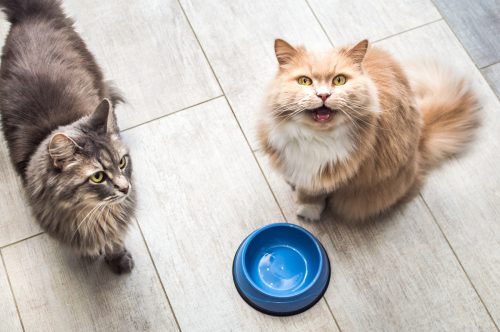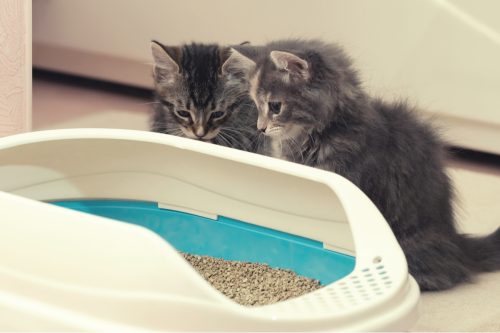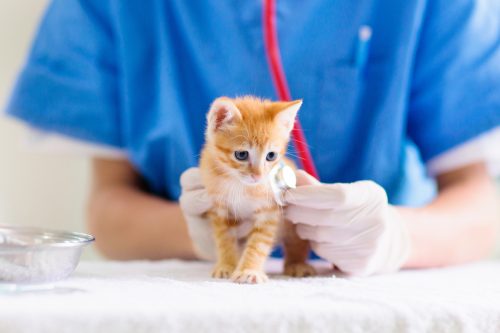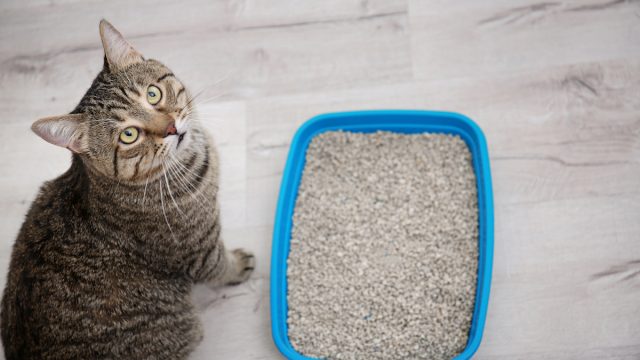4 Reasons Your Cat Is Peeing Outside the Litter Box, Vets Say
No, they're not just mad at you. Here's what this troubling feline behavior means.
As any cat owner knows, the smell of feline urine can be impossible to get rid of. And if your cat has peed on the floor or furniture, there's a good chance they'll be drawn to do it in this same spot again. It's often said that cats pee when they're mad at their owners—maybe you started going back to the office after a year at home, or perhaps you had a new baby who's getting all the attention. But while animals certainly feel stress and sadness, anger is not why they'll commonly have an accident. After speaking to veterinarians, we learned that there are four main reasons why your cat is peeing outside the litter box. Keep reading to find out what they are, and how you can curb this troubling feline behavior.
READ THIS NEXT: The 6 Best Dog Breeds That Get Along With Cats, According to Experts.
1
They're stressed.

As mentioned, cats can absolutely feel emotions. However, peeing outside the litter box is rarely done to teach you a lesson, as is commonly assumed. It's usually because they feel stressed, and just like humans, they develop nervous habits.
"Cats are sensitive animals that can be easily stressed out by changes in their environment," explains Melissa M. Brock, a board-certified veterinarian and author at Pango Pets. "Things like moving homes or introducing new pets or furniture can cause them to feel confused or even threatened by something they once took for granted as 'normal.' This is especially true when it comes to their litter box because it seems like such a simple thing—but it's actually a big deal for some cats!"
According to Mikel Maria Delgado, PhD, a cat behavior expert with Rover, as soon as you notice your cat pee outside the litter box, assess if their emotional needs are being met: "Do they have places to feel safe? Do they get along with other animals in the home? Do they have scratching posts and things to keep them busy (such as food puzzles, perches, toys)? Do you provide your cat with exercise each day through interactive play?" Sometimes, all it takes to get things back on track is a little extra love and attention.
2
They're marking their territory.

Major stressors for cats are new family members, such as another pet or baby. In these cases, your feline may engage in what's known as marking. "If you've brought in a new cat or other animals into the house, and your cat isn't quite getting along with them, peeing outside the litter box could be an act of dominance to establish their territory," explains Jacquelyn Kennedy, founder and CEO of PetDT.
If this is the case, Kennedy recommends socializing your cat appropriately. For example, most vets recommend keeping a new cat separate for several days and introducing them gradually. She also suggests giving each cat their own space, so they don't feel threatened. For male cats, neutering will also lessen their desire to "spray" or mark their space, according to Courtnye Jackson, a veterinarian and founder of The Pets Digest.
For more pet advice delivered straight to your inbox, sign up for our daily newsletter.
3
They're unhappy with their litter box or litter.

Humans have a basic desire to utilize a clean bathroom in private—and cats are not much different. "Cats have more olfactory receptors than humans. What might be clean to us is not to your cat," notes Lea Fronterhouse, ABCCT, FFCP, a cat behavior consultant and trainer at Cat's Pajamas Consulting. "Try scooping multiple times daily with a complete litter replacement and wash the box with mild unscented soap every two weeks."
Cats also may hesitate to go in a litter box that's just been used by another cat. According to Delgado, "You should have at least one box per cat plus one extra box, so if you have one cat, two boxes; if you have two cats, three boxes, etc."
It could also be that your kitty doesn't like the type of litter you're using. Scented or coarse litter can bother their nose and paws, so Delgado says "soft, sandy, unscented litter" is ideal.
Or, the issue could be with the box itself. Some cats find their setup too exposed, so they prefer a covered litter box, while others like to do their business standing up and find a lid obstructive. Delgado dislikes "robot" (self-cleaning) litter boxes, "as they don't offer enough space for cats, and some cats find the mechanism scary."
And, of course, ensure that the box is large enough for your pet to feel comfortable. "Typically, the litter box should be one-and-a-half times the length of your cat," advises Danny Jackson, co-founder, CEO, and chief editor of Pet Lover Guy.
Finally, consider where the box is located. "Cats don't want to do their business in a busy area of the house. If the litter box is placed somewhere where there's a lot of foot traffic, then you may want to try placing it somewhere that's a little less exposing for your furry friend," says Danny.
In addition, Courtnye recommends having one litter box on each floor if you have a multi-level house. Sometimes the problem could be as simple as your cat not being able to hold it!
4
They're sick.

If there's any doubt that your cat's litter box woes aren't behavioral as described above, make an appointment with your vet immediately. According to Jamie Whittenburg, DVM, lead veterinarian at Cat World, the most common health issues that would cause urinating outside the litter box are cystitis, urinary tract infections (UTIs), urethral obstructions, and bladder stones.
"Cystitis is the medical term for inflammation of the bladder," explains Whittenburg. "This condition is the number one cause of inappropriate urination I see in cats in my practice." Though she notes that vets aren't certain how cystitis develops, she says stress definitely plays a role. "These cats will often strain, go to the litter box frequently, have blood in their urine, and urinate outside of the litter box, often in sinks, bathtubs, and on clothing," Whittenburg adds. Treatment includes a moisture-rich diet, special prescription foods, stress management, and pain relievers.
It's commonly believed that UTIs are the main culprit behind this behavior. But Whittenburg says it's much less common. "Females are at higher risk due to their shorter urethras, but I see many cases of cystitis incorrectly diagnosed as a UTI," she notes. "A true UTI is caused by bacteria in the bladder." If a urinalysis shows bacteria, your vet can simply prescribe antibiotics.
Male cats are more prone to obstructions in the urethra. "Small crystals and mucus formed in the bladder move into the narrowing urethra and block it. A complete obstruction will make the cat unable to urinate and is an absolutely life-threatening emergency. However, partial obstructions can be painful and cause a cat to urinate outside of their litter box," explains Whittenburg. She cautions that partial obstructions can quickly turn complete, so don't hesitate in making an appointment with your vet.
Crystals in the urine can also "coalesce and form stones in the bladder," she says. "The stones irritate the bladder walls and cause discomfort and urgency. These cats often urinate outside of their litter boxes." Not only is this painful for your kitty, but it can lead to urethral obstruction and even death. "If a bladder stone is seen on an x-ray or ultrasound, your veterinarian will obtain a urine sample to determine the stone type. Some stones can be dissolved with special diets, while others will require surgical removal," Whittenburg adds.






















